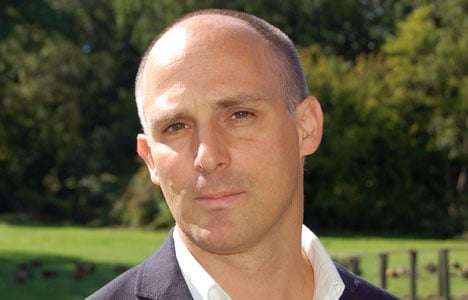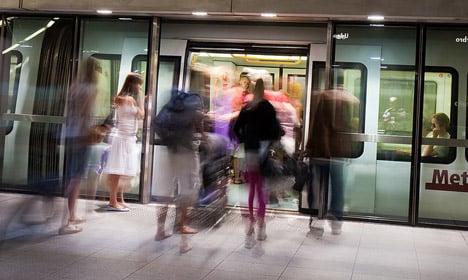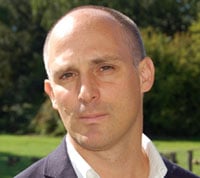BOOTH
It may not be perfect but it’s home
Author and journalist Michael Booth caused a bit of a ruckus by 'attacking' the Nordic model. In his first weekly column with The Local, he makes peace with his adopted homeland (well, sort of).
Published: 24 June 2014 22:29 CEST

The Local columnist Michael Booth.
My grandmother always used to say, “Michael, if you can’t say anything nice, don’t say anything at all.”
In January I wrote a now mildly infamous article in the Guardian newspaper about Denmark and the other Nordic countries which they headlined: ‘The Dark Heart of Scandinavia’.
As many online commenters pointed out, the piece was a brazen attempt to draw attention to my new book, The Almost Nearly Perfect People: The Truth About the Nordic Miracle, but I also wanted to bring a little balance to the absurdly idealized picture of Denmark and Scandinavia presented by the British (and American) media over the last decade.
So, I pointed out that the Danes were work-shy environmental hypocrites, who, despite paying the world’s highest taxes still endured lacklustre public services (today, I would probably add something about the recent and alarming statistics regarding violence towards women – they are European record holders, apparently). I also mentioned that the Norwegians had been corrupted by their oil wealth and were in denial of its consequences; that the Finns got a bit fighty after a drink; that the Swedes were arms-peddling stiffs; and the Icelanders semi-feral highwaymen of high finance.
Sorry Grandma.
The response was instant and global. The piece was shared by 70,000 people on Facebook, commented on by almost 3,000 and read by over two million, putting it in the top two percent of the Guardian’s most-read pieces of all time. Within hours I was contacted by journalists from New Zealand to Chile. They are still calling.
Some people got a bit cross. There were threats to my family on right-wing Norwegian notice boards and an abundance of imaginative personal insults in the comments. DR2’s pedant fest, Detektor, took me to task. They grudgingly agreed there was a truth to much of what I wrote but questioned my sources (a bunch of cockamamie organizations such as the United Nations, Statistics Denmark and the OECD).
Equally, though, many were relieved that, finally, someone was telling a different truth about the Nordic region than the one the world’s media had been feeding us for the last decade – in many cases people who had actually lived here, or were married to Scandinavians.
As well as the very un-Jante Law motive of promoting my book, I really wanted to shake Guardian readers out of their Scandi-trance, to wake them from their Nordic torpor. For the last ten years, they had been drip fed rose-tinted stories about the north – about its food, its schools, welfare systems, gender equality, environmentalism, knitwear, prisons, TV shows and baristas – depicting a kind of utopia on earth. Every week it seemed the New York Times heralded the Nordic model, or the Sydney Herald claimed that Danish TV was the best in the world, or the Guardian would gush about how idyllic life was in Frederiksberg. National Geographic ran a cover story recently that literally claimed nothing ever went wrong in Copenhagen.
I have contributed to this deluge of pro-Denmark propaganda in my time (full disclosure: I’m the one who keeps persuading Monocle magazine that Copenhagen is the world’s most ‘liveable’ city), but it seemed to me that we had become blinded by the Northern Lights.
It used to be the world was in thrall to the Mediterranean dream – of having a house amid the olive groves or orange orchards – but following the collapse of the eurozone, the pull of the magnetic north grew ever-more irresistible. I think people had a yearning for a more ‘back to basics’ approach to life and were drawn to the idea of a fundamental reorientation of societal values on the Scandinavian model. And there were doubtless many who just liked the lampshades and chairs.
Many mistook my piece as a ‘UK = good/ Scandinavia = bad’ rant. It was no such thing. I lived in the UK for 30 years, and that was plenty for me. I live in Denmark of my own free will and I consider myself lucky to do so. Though some may deem it ill-mannered to criticize my hosts, I am sure the Danes and their culture are robust enough not to care.
Of course, my book is much more nuanced than the Guardian piece. I strongly believe that there is a great deal the world can learn from how the Nordic tribes run their societies and if anyone can be deemed the happiest in the world, then the Danes seem strong candidates to me.
Fortunately for me, they are a forgiving bunch (as Lars Løkke Rasmussen is finding). Since the article detonated I have performed my ‘Truth about the Danes’ schtick at libraries across the land as well as to august bodies ranging from the Nordic Council of Ministers to Dong Energy.
Earlier this month, for instance, I was invited along to Folkemødet on Bornholm to debate the topic ‘Is Nordic Cool?’.
So, is Denmark still cool? Yes, probably, but let’s not pretend it’s perfect.
Michael Booth is the author of The Almost Nearly Perfect People: The Truth About the Nordic Miracle available now on Amazon and is a regular contributor to publications including the Guardian and Monocle.
Url copied to clipboard!


 Michael Booth is the author of The Almost Nearly Perfect People: The Truth About the Nordic Miracle available now on
Michael Booth is the author of The Almost Nearly Perfect People: The Truth About the Nordic Miracle available now on  Please whitelist us to continue reading.
Please whitelist us to continue reading.
Member comments